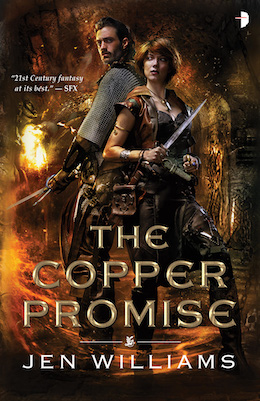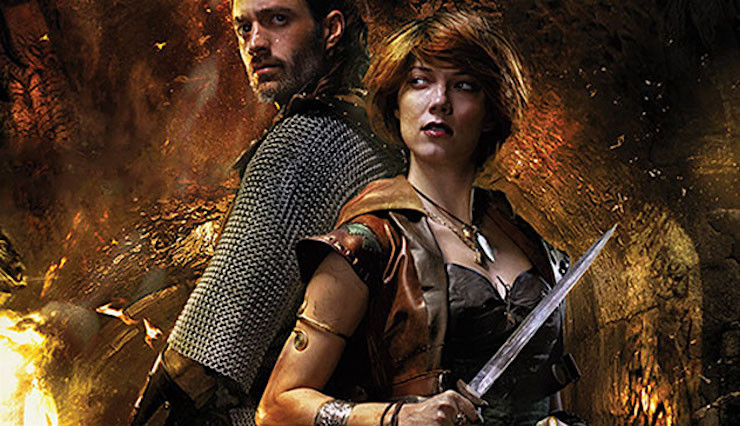I used to have a real problem with fantasy. Not as an idea—I love The Lord of the Rings movies and Alan Garner books get me through adolescence—but as an investment of time. I felt, for a long time, that there was no fantasy I could read that wasn’t 15,000 pages long, did not have a cast of hundreds, and that required at least one degree in medieval history to really get.
I am absolutely delighted to discover just how wrong I was.
Over the last few years, a wave of new authors have come to the fore whose work in the fantasy genre has completely changed how I feel about it. There’s no pretentiousness to what they do, no increasingly tedious terse, hooded man on the cover, and certainly no grimdark whatsoever. Instead, Den Patrick’s Erebus Sequence, Liz de Jager’s Blackhart Legacy, Andrew Reid’s Kingdom’s Fall and Jen Williams’ Copper Cat series have re-focused my perceptions of the genre. The epic length is there, and the casts are often on the big side, but all these books are defined by their characters and, in turn, by those characters’ fallibility.
That’s especially true of Williams’ series. First published in 2013 as a series of four novellas, then as a full novel, The Copper Promise has just recently arrived in the U.S. and Canada. It is, without a shadow of a doubt, some of the most fun you can have reading words on a page. Here are some of the reasons why.
Williams has an incredible knack for character and her three leads are all instantly likeable.
Well, Wydrin and Seb are. Frith grows on you.
 Wydrin and Seb are mercenaries. Wydrin is a thief, a knife-fighter, and a mostly retired pirate who is tremendously fond of money, beer, and getting paid for doing her work. She’s unflappable, rarely shuts up, and talks herself into as many situations as she talks herself out of. If you’re an Avatar fan, think of Wydrin as Toph with eyesight and knives instead of blindness and earthbending.
Wydrin and Seb are mercenaries. Wydrin is a thief, a knife-fighter, and a mostly retired pirate who is tremendously fond of money, beer, and getting paid for doing her work. She’s unflappable, rarely shuts up, and talks herself into as many situations as she talks herself out of. If you’re an Avatar fan, think of Wydrin as Toph with eyesight and knives instead of blindness and earthbending.
She’s the brains of the operation, and Seb is very much the brawn. And the conscience. An exiled knight, Sebastien is a towering colossus of a man who is fundamentally lovely and profoundly, epically unlucky. The reasons for his exile are grossly unfair and they’re explored at length, but what makes him likeable is how much he sticks to the principles of the order that betrayed him. Sebastien isn’t a knight made but a knight born. He’s also much less ethically-challenged than Wydrin and, fundamentally, far angrier. The way that anger is exploited in The Copper Promise is one of the most insidious, disturbing things I’ve read and the consequences of Seb’s actions are massive.
Together, Seb and Wydrin are an incredibly smart, multi-layered double act. They complete each other in a way that’s completely platonic and at the same intimate. Between the pair of them there’s an entirely functional human being—they just take turns working out which bits are needed. It’s a classic double act: funny, sad, and sweet often all at the same time. They’re hard-travelling heroes, although a lot of The Copper Promise is about them making their peace with the idea that they might, in fact, be the good guys.
And then there’s Frith. A crippled young noble and magic user whose house and title has been stolen out from under him, Frith is the client. Which means he’s the money. And also that he’s incredibly grumpy. Frith is the spikiest of the three and in the hands of a lesser author he’d be a fairly bog standard embittered Mage. Instead, Williams uses Frith as the pivot that the entire book turns on. He is an intensely privileged young man who has had everything, including his health, cut away. His actions in response to those wounds are savage and driven entirely by the need for vengeance.
He gets it.
That’s when the trouble starts.
For everyone.
Frith leads them into the vaults beneath The Citadel. In essence a feral bank, the Vaults are where everyone who has riches hides them. Traps are everywhere, there is no clear record of everything in there and the people who go in don’t come out.
So, of course, Wydrin and Seb jump at the chance to be the first ones to make it out of The Citadel alive.
The first section of the novel deals with what is, like much of The Hobbit, essentially a bank job. It goes south very fast and Williams gets an early chance to show off how well she writes action as the team and their assistants come under constant threat. This all culminates in a wide variety of extremely awful things happening and something unspeakable being unleashed on the world.
Better still, it culminates in Wydrin and Co. doing what everyone else would do in that situation: running away very, very quickly.
This is where the genius of Williams’ work comes into play. These people are absolutely not heroes and when faced with something huge and bad, they decide to get as far away as quickly as possible. They don’t so much go into denial as buy property there, and the middle of the book deals with the consequences of that. Frith gets his vengeance, Wydrin gets to check in with her family and get (mostly) paid, and Seb gets to have a wide variety of terrible things happen as a result of his choices. The chaos they unleash echoes out across the world, always patiently stalking them down, always marching across the map towards its furthest shore. And, brilliantly, always being changed by what it sees and kills. This isn’t a stereotypical world that meekly falls under the sway of a monolithic darkness. It’s an untidy, scrappy world full of real people who are all the stars of their own stories but don’t all make it out alive. Even those that do are irreparably changed by the events they experience and, through that, Williams ensures that everything we see we can relate to. Nothing is simple, nothing is universal, and nothing is the same by the end of the book.
Well, aside from Wydrin’s fondness for coin, ale, and how much of the latter she can get with the former.
The Copper Promise is the first of a trilogy and each of its sequels are as good if not better than the first. The Iron Ghost in particular features the most gloriously audacious action sequence I’ve ever read. But the three books, and their three leads, are tied together by more than events. None of them are heroes by choice, none of them especially want to be where they are, and none of them, for a second, shirk making the tough choices. They’re us: scrappy, untidy, lazy and, on occasion, glorious. They were my guides back into fantasy as a genre and I’m delighted that the U.S. is finally going to get to meet them.
Just…buy Wydrin a drink first yeah? In fact, maybe get a tab set up. It’ll be cheaper in the long run…
Alasdair Stuart is a freelancer writer, RPG writer and podcaster. He owns Escape Artists, who publish the short fiction podcasts Escape Pod, Pseudopod, Podcastle, Cast of Wonders, and the magazine Mothership Zeta. He blogs enthusiastically about pop culture, cooking and exercise at Alasdairstuart.com, and tweets @AlasdairStuart.










